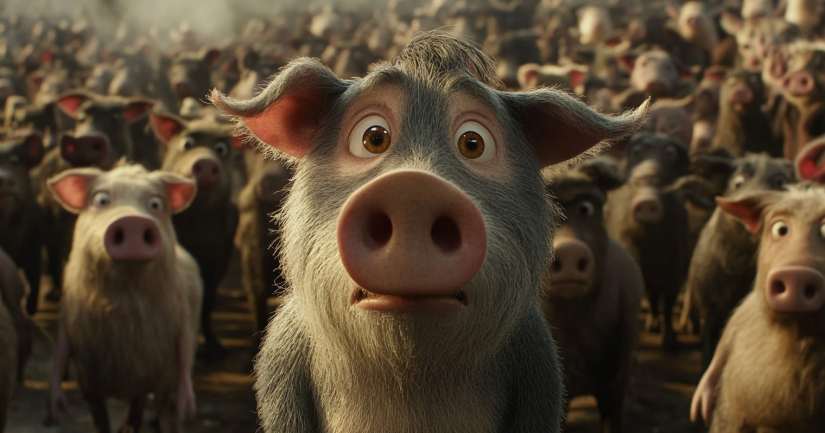
Welcome to the Animal Farm Chapter 2 Quiz! This engaging quiz offers a chance to dive deeper into George Orwell’s classic tale. As you answer the questions, you’ll reinforce your understanding of key themes and character developments. Each question challenges you to think critically about the events that shape the story.
By participating, you’ll uncover important insights about leadership, power dynamics, and the struggles for equality. You will explore how the animals adapt to their new society and the changes that unfold after the rebellion. Expect to reflect on the motivations behind their actions and the implications of their choices.
This quiz not only tests your knowledge but also encourages you to connect the dots between the characters’ decisions and the broader messages of the book. You’ll gain a clearer perspective on how these elements reflect real-world issues. Animal Farm just keeps getting better! Check out what happens next in our Animal Farm Chapter 3 Quiz
Start the Animal Farm Chapter 02 Quiz Now
Enter Orwell’s World of rebellion and power – test yourself with the Animal Farm Book Quiz.
or take a look at the sequence of events in our Animal Farm Order Of Events Quiz.
What Happened – Animal Farm Chapter 2
In Chapter 2 of Animal Farm, the animals prepare for rebellion following Old Major’s death. Inspired by his vision of freedom, the pigs—especially Snowball, Napoleon, and Squealer—begin organizing and teaching animalism to the others. The pigs establish themselves as leaders because of their intelligence. Some animals, like Boxer and Clover, quickly embrace the idea, while others, such as Mollie, show reluctance, fearing the loss of human luxuries.
The rebellion comes sooner than expected when Mr. Jones neglects to feed the animals. Starving and frustrated, they break into the feed shed, prompting Jones and his men to react violently. The animals, led by the pigs, retaliate and manage to chase Mr. Jones and his men off the farm, taking control of the land. They rename it “Animal Farm” and establish seven commandments based on animalism, aiming to create a fair and equal society. Snowball and Napoleon paint the commandments on the barn wall as guiding principles for the animals’ new society. The chapter closes with the animals joyfully celebrating their newfound freedom, optimistic about the future.
Animal Farm Chapter 2 – Quotes
- “The work of teaching and organizing the others fell naturally upon the pigs, who were generally recognized as being the cleverest of the animals.” – Narrator, explaining why the pigs assume leadership roles, establishing their position in the hierarchy.
- “All men are enemies. All animals are comrades.” – Pigs, teaching the principles of animalism to the others, reinforcing the unity among animals and opposition to humans.
- “The animals were happy as they had never conceived it possible to be. Every mouthful of food was an acute positive pleasure, now that it was truly their own food, produced by themselves and for themselves.” – Narrator, illustrating the animals’ joy in their independence, highlighting the initial idealism of animalism.
- “Four legs good, two legs bad.” – Snowball, introducing a simplified version of animalism’s principles, which becomes a rallying cry for the animals.
- “The Commandments were written on the tarred wall in great white letters that could be read thirty yards away.” – Narrator, describing the public posting of the commandments, symbolizing the animals’ commitment to their new society.
Animal Farm Chapter 2 – FAQ
In Chapter 2, the animals begin organizing themselves after the successful rebellion against Mr. Jones. They establish the principles of Animalism and set about creating rules to govern their new society. The pigs, particularly Napoleon and Snowball, take on leadership roles, and the animals work together to harvest the farm’s crops. This chapter highlights the initial enthusiasm and unity among the animals as they strive for a better life.
Initially, the animals hold the pigs in high regard due to their intelligence and leadership. However, as the pigs start to assume more authority, some animals begin to question their motives. The pigs begin to exploit their status, leading to a subtle shift in perception. While many still trust their leaders, a sense of unease begins to develop among the more observant animals.
The Seven Commandments serve as the foundational laws of Animalism, designed to ensure equality among all animals. They are painted on the barn wall for everyone to see. However, as the pigs interpret these commandments to suit their interests, the animals’ understanding of equality starts to become distorted, foreshadowing future conflicts.
This chapter begins to illustrate the theme of power and corruption through the pigs’ gradual assumption of authority. While they initially promote equality, their actions suggest a desire for control. The seeds of corruption are planted as the pigs prioritize their own comfort over the collective welfare, hinting at the dangers of unchecked power.
Readers can learn about the complexities of leadership and the potential for corruption in any system of governance. The importance of vigilance and questioning authority becomes paramount, as blindly following leaders can lead to the erosion of equality and justice. This chapter serves as a cautionary tale about the responsibilities of those in power and the need for accountability.
